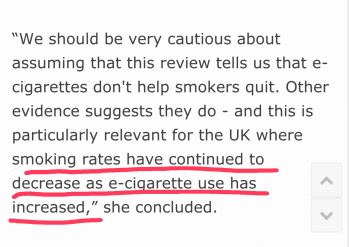
Researchers criticise study claiming e-cigarettes may lower chances of successfully quitting
News report
15 January 2016
Cancer Research UK

Image via Wikimedia Commons under CC-BY-2.0
A new US study claims that smokers who don’t use e-cigarettes are more likely to quit smoking than those who use them.
“Despite being wide-ranging the paper's conclusions are tentative and sometimes incorrect.” - Professor Linda Bauld, Cancer Research UK
But experts have been quick to point out the numerous limitations of the study, with the conclusions being at best preliminary or at worst “grossly misleading” according to Professor Peter Hajek, Director of the Tobacco Dependence Research Unit, Queen Mary University of London.
Researchers from the University of California, San Francisco, reviewed the findings of 38 e-cigarette use studies from around the world and concluded that smokers who use the “vaping” devices were 28 per cent less likely to successfully give up smoking tobacco compared to those not using e-cigarettes.
The contested results are in direct conflict with many of the claims made by tobacco-control scientists and advocates, as well as previous reviews that suggest e-cigarettes are safer than conventional tobacco cigarettes and may lead to cessation.
“The irony is that quitting smoking is one of the main reasons both adults and kids use e-cigarettes, but the overall effect is less, not more, quitting,” co-author Stanton Glantz said in a statement issued by the university.
“While there is no question that a puff on an e-cigarette is less dangerous than a puff on a conventional cigarette, the most dangerous thing about e-cigarettes is that they keep people smoking conventional cigarettes.”
However, Professor Linda Bauld, Cancer Research UK’s prevention champion, said: “Despite being wide-ranging the paper's conclusions are tentative and sometimes incorrect.”
She went on to explain that the studies included in the review were too different in design to directly compare and many don't include adequate measures of use or cessation.
Further, some of the devices they included are no longer available on the market, some relevant literature is excluded and the way some of the studies are set up means they miss the people who have succeeded in quitting using e-cigarettes.
“We should be very cautious about assuming that this review tells us that e-cigarettes don't help smokers quit. Other evidence suggests they do - and this is particularly relevant for the UK where smoking rates have continued to decrease as e-cigarette use has increased,” she concluded.
References
- Kalkhoran, S. Glantz, SA. "E-Cigarettes And Smoking Cessation In Real-World And Clinical Settings: A Systematic Review And Meta-Analysis". N.p., 2016. Web. 15 Jan. 2016. DOI:10.1016/S2213-2600(15)00521-4





